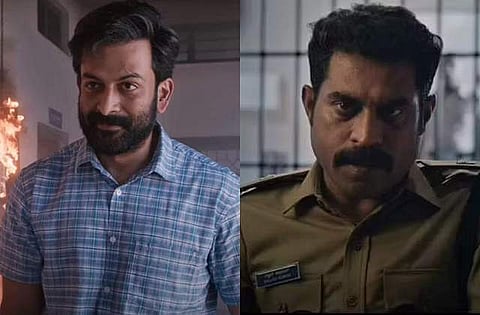
- LIFESTYLE
- FASHION
- FOOD
- ENTERTAINMENT
- EVENTS
- CULTURE
- VIDEOS
- WEB STORIES
- GALLERIES
- GADGETS
- CAR & BIKE
- SOCIETY
- TRAVEL
- NORTH EAST
- INDULGE CONNECT

One of the most remarkable qualities of Dijo Jose Antony's Jana Gana Mana is how it maintains a sense of urgency throughout its entire duration (close to three hours). It behaves like an extended third act of a suspense thriller. When it opens, a grave event has already occurred. Emotions are already running high. It dangles what passes as truth in front of you, and for a while, you buy it. But whose version of the truth are you being sold? Is it that of the media, cops, or lawyers?
Cast: Prithviraj Sukumaran, Suraj Venjaramoodu, Mamta Mohandas, Vincy Aloshious, Shari
Director: Dijo Jose Antony
It's only when a barrister, Aravind Swaminathan (Prithviraj Sukumaran), shows up in court and starts busting one 'truth' after another that your perceptions begin to alter gradually. Jana Gana Mana is like a Rubik's cube whose 'true' combination changes every few minutes. It follows a Rashomon-style way of seeking the truth without emulating the Akira Kurosawa classic's screenplay structure.
The other impressive quality about Jana Gana Mana is how it feels like three or four movies rolled into one. As each layer comes undone, one imagines all kinds of tangents the film can go in. I can't recall the last time a Malayalam film did that to me. (If you're wondering why I haven't mentioned anything about the story yet, then I have to tell you that I'm trying to find a way to write this review without giving away any major plot points.)
Jana Gana Mana brings together Prithviraj and Suraj Venjaramoodu again after the immensely successful Driving Licence (currently being remade in Hindi as Selfiee). Naturally, you expect great things from any film involving them after that. And Jana Gana Mana doesn't disappoint. I don't know if it would be fair to say whether one film is better than the other. Both actors deliver what is expected of them. Their characters in Jana Gana Mana are miles apart from those in Driving Licence.
Do I need to mention Suraj's impressive range at this point? The first hour is devoted entirely to Suraj's police character, Sajjan Kumar, who is assigned to contain a violent JNU-type situation at a large university in Karnataka. I'm not going into all the spoiler-ish details because this movie is packed with plenty of information. I would rather the viewer approach this film the same way I did -- with as little information as possible. It uses various picked-from-the-headlines incidents from recent memory as inspirations to make piercing statements about many ills currently plaguing the country.
And among the contemporary superstars, I can't think of anyone better than Prithviraj to deliver piercing dialogues that reverberate across the courtroom walls and everyone sitting in the movie hall. And Shammi Thilakan seems to have much fun being the rival litigator. He is, I must add, the primary source of humour in the film -- and I don't mean the unintentional kind.
Yes, certain areas in Jana Gana Mana get slightly theatrical and loud, but why should one expect the vibe of a Dileesh Pothan or Rajeev Ravi film from it? Jana Gana Mana is a big-scale, mass-appeal entertainer in the vein of the political thrillers that Renji Panicker wrote for Shaji Kailas in the early 90s or what Dennis Joseph wrote for Joshiy or Thampi Kannanthanam in the 80s. Parts of Jana Gana Mana evoked the spirit of films like Thalasthanam (1992), Bhoomiyile Rajakkanmar (1987), New Delhi (1987), and Pathram (1999).
But where Jana Gana Mana stands out is how, in terms of the statements it makes, it dares to be bolder than the above films. As much as I hold the writers and filmmakers of that era in high regard, I don’t think they would have addressed issues like marginalisation and sensationalism to the degree that it is done here. I’m glad that we are no longer living in the 80s and 90s.
By the end of Jana Gana Mana, we get a sense of the personalities of Aravind and Sajjan. But it's not over. The film opens up the possibilities of exploring more sides to them that we haven't seen before. We are told, through Aravind, that the story has only begun. (The makers had already announced the sequel plan.) This approach is refreshing because, unlike the other epic two-parters like Baahubali, KGF, or Pushpa, Jana Gana Mana dares to be epic in terms of topicality. It is indeed an epic but in terms of storytelling ambitions, not the visuals. The first film opened many cans of worms, and I hope its successor opens many more too. And as a fan of Prithviraj and Suraj, I can't wait to see what surprises they would spring in that one.